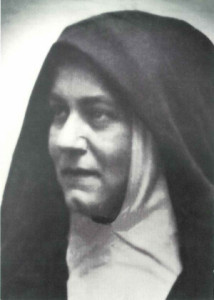St Theresa Benedicta of the Cross

Martyr. Patron of Europe. Edith Stein, born in 1891 in Breslau, (now Wroclaw) Poland, was the youngest child of a large Jewish family. She was an outstanding student, well versed in philosophy with a particular interest in phenomenology.
While Stein had earlier contacts with Roman Catholicism, it was her reading of the autobiography of Saint Teresa of Ávila during summer holidays in Bad Bergzabern in 1921 that caused her conversion.
Baptized on 1 January 1922, in Cologne Cathedral, she was dissuaded by her spiritual advisers from immediately seeking entry to the religious life, and obtained a position to teach at the Dominican nuns' school in Speyer from 1923 to 1931. While there, she translated Thomas Aquinas' De Veritate (Of Truth) into German, familiarized herself with Roman Catholic philosophy in general, and tried to bridge the phenomenology of her former teacher, Husserl, to Thomism. She visited Husserl and Heidegger at Freiburg in April 1929, the same month that Heidegger gave a speech to Husserl, on his 70th birthday.
In 1932 she became a lecturer at the Catholic Church-affiliated Institute for Scientific Pedagogy in Münster, but antisemitic legislation passed by the Nazi government forced her to resign the post in 1933.
In a letter to Pope Pius XI, she denounced the Nazi regime and asked the Pope to openly denounce the regime "to put a stop to this abuse of Christ's name."
Her letter received no answer, and it is not known for certain whether the Pope ever read it. However, in 1937 the Pope issued an encyclical written in German, Mit brennender Sorge (With Burning Anxiety), in which he criticized Nazism, listed violations of the Concordat between Germany and the Church of 1933, and condemned antisemitism.
Edith Stein entered the Discalced Carmelite monastery St Maria vom Frieden (Our Lady of Peace) in Cologne in 1933 and took the religious name of Teresa Benedicta of the Cross. There she wrote her metaphysical book Endliches und ewiges Sein (Finite and Eternal Being), which attempted to combine the philosophies of St Thomas Aquinas and Husserl.
To avoid the growing Nazi threat, her Order transferred her and her sister, Rosa, who was also a convert and an extern sister of the Carmel, to the Discalced Carmelite monastery in Echt, Netherlands. There she wrote Studie über Joannes a Cruce: Kreuzeswissenschaft ('Studies on John of the Cross: The Science of the Cross').
Even prior to the Nazi occupation of the Netherlands, Stein believed she would not survive the war, going as far to write the Prioress to request her permission to 'to offer herself to the heart of Jesus as a sacrifice of atonement for true peace' and created a will. Her fellow sisters would later recount how Stein begin "quietly training herself for life in a concentration camp, by enduring cold and hunger" after the Nazi invasion of the Netherlands in May 1940.
When the Nazis conquered Holland, Teresa was arrested, and with her sister Rose, was sent to the concentration camp at Auschwitz. Teresa died in the gas chambers of Auschwitz in 1942 at the age of 51.
In 1987, she was beatified in Cologne Cathedral by Pope John Paul II and canonized by him on October 11, 1998.
On that day, the Holy Father said: "Out of the unspeakable human suffering caused by the Nazis in western Europe in the 1930s and 1940s, there blossomed the beautiful life of dedication, consecration, prayer, fasting, and penance of Saint Teresa. Even though her life was snuffed out by the evil of genocide, her memory stands as a light undimmed in the midst of evil, darkness, and suffering."
For further reading see: www.edith-stein.com/?page=start_eng&language=eng












